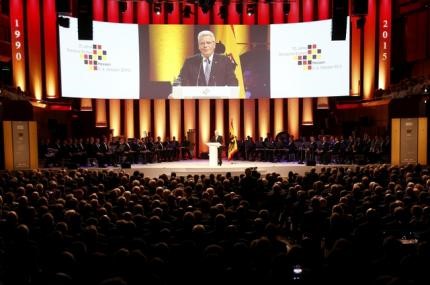By Michelle Martin
BERLIN (Reuters) - As Germany celebrated 25 years since reunification on Saturday, President Joachim Gauck said Europe's refugee crisis posed a greater challenge to the country than the welding together of western Germany and the former communist East.
Gauck, a former Lutheran pastor from East Germany who played a prominent role in the peaceful protests there that led to the fall of the Berlin Wall in 1989, said the two halves of the country had become one over the past quarter of a century.
"What belongs together has grown back together," he told an audience in Frankfurt that included Chancellor Angela Merkel and civil rights campaigners from the former East.
But Gauck said the process of restoring unity had been much harder than many people had imagined amid the euphoria of 1989 and 1990.
Back then, west Germans cheered and clapped their eastern peers as they crossed the border that had separated them for decades in their Trabis, the iconic cars of East Germany.
More recently Germans have applauded refugees fleeing countries like Syria as they arrived at Munich's central train station. The government estimates that 800,000 or more people might come to Germany over the course of 2015.
Gauck, who has a largely ceremonial role but is considered a moral authority for the nation, warned that integrating refugees with different religions and cultures would be much tougher than uniting Germans, who had shared the same language, national culture and history even during their separation.
"Just like in 1990 we're all facing a challenge that will occupy us for generations. But unlike back then, something is now supposed to grow together that has not belonged together until now," he said.
PLEA FOR TOLERANCE
Gauck urged Germans to be patient, saying it would take time to get used to an environment in which "some of what is familiar is gone" while refugees would need time to get used to a society that would sometimes put them in conflict with their traditional norms.
Gauck urged refugees to make an effort to integrate into German society and stressed that German values such as human dignity, equal rights for women and homosexuals and respect for the secular law regardless of any religious affiliations were "not up for debate".
His comments reflect growing concern in Germany that the huge influx of refugees could put strain on the liberal values at the heart of modern democratic Germany and he suggested the country would not show "tolerance in return for intolerance".
While still welcoming the newcomers, Germany is now focusing increasingly on the need to ensure respect for German culture. Germany has translated parts of its constitution which outline basic rights such as freedom of speech into Arabic.
Most of the refugees fleeing conflicts and poverty in the Middle East, Africa and beyond come from conservative Muslim societies with much more traditional ideas about the role of women, homosexuality and other issues.
Gauck and Merkel, who also grew up behind the Iron Curtain in the former East, both called for more help from other countries in dealing with the refugee crisis.
"Germany can't solve the problem alone but only in cooperation with Europe by a fair division of tasks and with the rest of the world," she said.
Gauck also called for people to show understanding for eastern European countries and even eastern Germany taking a different stance in the debate on refugees to western Europe.
While western Germany was able to get used to being a country of immigration over decades, he said, many people in the east had hardly had any contact with immigrants before 1990.
There are still far fewer migrants in eastern Germany than in the west of the country.
EAST STILL LAGS
Gauck said changing attitudes towards refugees and migrants could only be the result of years of tough learning processes and being aware of this should make it easier to respect other nations' experiences - an apparent reference to eastern European states such as Hungary and Slovakia which have opposed binding quotas for distributing refugees within the EU.
Gauck said there were still differences between Germany's east and west but they had got smaller over the years and had "almost completely disappeared" among the younger generation.
He acknowledged that for many in the east, reunification had not only meant the introduction of colourful travel catalogues, fast cars and full shelves in shops but also mass unemployment, the winding down of nationally-owned companies, mass migration and empty buildings.
In eastern Germany, unemployment is still higher than in the west while wages and economic output are lower. A study published earlier this year showed East German workers work longer and have lower productivity. Belonging to a religious community is less widespread in the east than in the west.

While the vast majority of Germans still think there are still big differences between western and eastern Germany, two-thirds welcome reunification, a survey of 80,000 by YouGov showed this week.